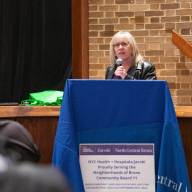New York Lawyers for the Public Interest recently filed suit against Chestnut Holdings, a property management company, for failing to provide vital services, control rodent infestations, and make necessary repairs to one of their buildings, located at 1520 Sheridan Avenue.
An electrical fire on August 6, 2011 forced the occupants of 14 apartments to vacate their homes.
On February 22, the Department of Building lifted its vacate order, and tenants have since been slowly moving back into their apartments.
Since the electrical fire, most of the remaining tenants in the building were left without gas, heat, and hot water for months.
According to Stephanie Rudolph, an attorney for New York Lawyers for the Public Interest, heat was restored to one side of the building in the end of January and to the other side on February 23.
“There is still an issue with heat and hot water,” Rudolph said. “It is very inconsistent in some apartments. During the time the residents had no gas, they were provided with electrical burners, which was very inconvenient for them, especially during the holidays.”
The building has nearly 150 open housing violations, and the landlord has failed to take adequate steps to remedy the situation, according to Randolph.
Many of the residents were forced into shelters, or to live with family and friends from August until just recently in February.
Tataria Burns, a tenant of 1520 Sheridan Avenue since 1977, lost all of her belongings in the fire.
Burns said, “I’m a social worker and I take about 1600 people off the street a year, and on August 6 of this year, I became homeless myself.”
Burns said because she had six people living in her apartment, she was referred to a YMCA shelter in Green Point, Brooklyn.
“I lost everything that I’ve earned and worked for,” Burns said. “I lived there with my grandmother since 1977, so I have been there for over 34 years.”
Burns said she has been given permission to move back into the apartment, and is slowly starting to rebuild.
During the time she was not living in the apartments Burns was supposed to file a rent-reduction form, which would require her to pay $1 a month in rent to secure her place in the building until she was given permission to return, but instead she filed an over charge form by mistake.
Burns was never told that she had filled out an incorrect form, and is now being sued by the landlord for the full amount of rent that Burns did not pay, while she was not living there.
Rudolph said she has filed a motion to dismiss the case, on the basis that there was an error with the paperwork that Burns was not notified of, and no other tenant was required to pay the full amount of rent during the time they were vacated from their apartments.
Burn said after looking back on the experience, she would advise people who rent to make sure they obtain renter’s insurance.
“It’s just that a home is your home, its your livelihood that you go to and relax and rest,” she said. “And one day it can all be gone.”




















